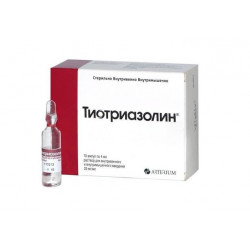



 All payments are encrypted via SSL
All payments are encrypted via SSL
 Full Refund if you haven't received your order
Full Refund if you haven't received your order
Solution for in / in and in / m introduction
1 ml of solution contains Thiotriazoline 0,025 g.
Excipients: water for injections.
In the package 10 ampoules of 4 ml.
The pharmacological effect of Thiotriazoline is due to anti-ischemic, antioxidant, membrane stabilizing and immunomodulating properties. It prevents the death of hepatocytes, reduces the degree of their fatty infiltration and the spread of centrolobular necrosis of the liver, promotes the processes of regeneration of hepatocytes, normalizes protein, carbohydrate, lipid and pigment exchanges in them. Increases the amount of synthesis and secretion of bile, normalizes its chemical composition. Thiotriazoline enhances compensatory activation of anaerobic glycolysis, reduces the inhibition of oxidation processes in the Krebs cycle while preserving the intracellular ATP pool. The drug activates the antioxidant system and inhibits lipid oxidation in the ischemic sites of the myocardium, reduces the sensitivity of the myocardium to catecholamines, prevents progressive suppression of the contractile function of the heart, stabilizes and reduces the areas of necrosis and myocardial ischemia, respectively. Improves the rheological properties of blood (activation of the fibrinolytic system).
Chronic hepatitis of various etiologies, liver cirrhosis. Coronary heart disease (as an additional tool): acute large-or small focal myocardial infarction, angina pectoris and rest, post-infarction cardiosclerosis, cardiac arrhythmia.
Care must be taken when prescribing the drug to patients with renal insufficiency. The drug is contraindicated in children under 5 years.
Preclinical studies have shown that the preparation has no teratogenic, embryo-lethal, and embryotoxic effects. Therefore, during pregnancy and lactation, the drug is prescribed if the expected benefit to the mother outweighs the potential risk to the fetus or child.
In chronic hepatitis with pronounced activity of the process and acute myocardial infarction In the first 5 days, Thiotriazoline is administered intramuscularly with 2 ml of a 2.5% solution 2-3 times a day (2-3 times with 50 mg), or intravenously slowly, at a rate of 2 ml / min. At the same time with 4 ml of 2.5% (100 mg) or drip at a rate of 20 to 30 drops per minute (2 ampoules of a 2.5% solution are dissolved in 150 to 250 ml of saline). From the fifth to the twentieth day of the disease prescribed Thiotriazoline pills (100 mg 3 times a day). In chronic hepatitis, minimal and moderate activity, angina pectoris and rest, and post-infarction cardiosclerosis, Thiotriazoline is administered intramuscularly in a dose of 2 ml of 1% solution 3 times a day. The course of treatment is 20-30 days.
With cirrhosis of the liver The course of treatment is 60 days.Treatment begins with intramuscular administration of 2 ml of a 2.5% solution 3 times a day (3 times 50 mg) for 5 days, then continue with treatment with pills (100 mg 3 times a day).
Children: in acute viral hepatitis, children between 5 and 11 years old in the first five days of the disease Thiotriazoline is given 1–2 mg / kg body weight intramuscularly twice a day, 1% or 2.5% solution, then 2 days for 14 days / kg body weight in pills three times a day. Older children Thiotriazoline is administered intramuscularly in a dose of 2 ml of a 2.5% solution twice a day, and then 1 pill 3 times a day for 14 days.
After intravenous administration, it is advisable 20 - 30 minutes. lie down. Preclinical studies have shown that the preparation has no teratogenic, embryo-lethal, and embryotoxic effects. Therefore, during pregnancy and lactation, the drug is prescribed if the expected benefit to the mother outweighs the potential risk to the fetus or child.
Thiotriazoline as a cardioprotective drug can be used in combination with the basic means of treating coronary heart disease. As a hepatoprotective agent, it can be combined with the prescription of traditional methods of treatment of hepatitis of the corresponding etiology.
Keep out of the reach of children, protected from light, at a temperature between + 15 ° C and + 25 ° C.
